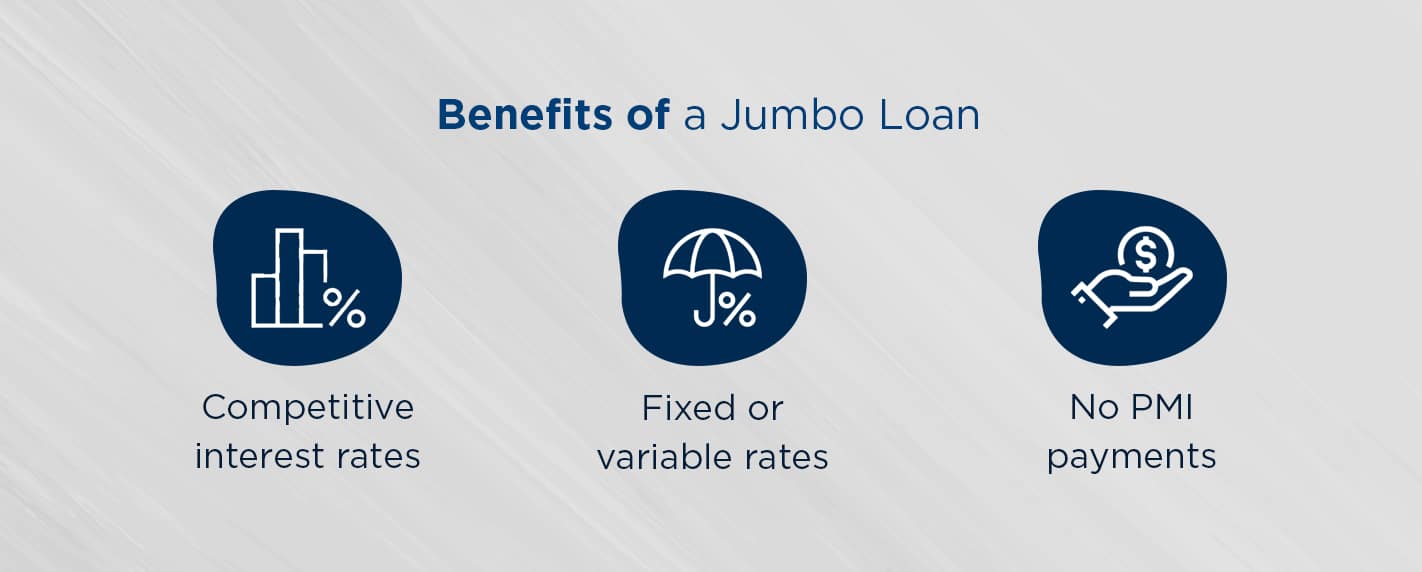Jumbo Loan: Funding Options for High-Value Feature
Jumbo Loan: Funding Options for High-Value Feature
Blog Article
The Effect of Jumbo Loans on Your Funding Choices: What You Required to Know Prior To Using
Jumbo lendings can play a crucial function in forming your financing options, especially when it concerns obtaining high-value homes. While they provide the chance for bigger car loan amounts without the burden of exclusive home loan insurance (PMI), they additionally feature strict qualification standards that require mindful consideration. Recognizing the equilibrium between the obstacles and benefits positioned by these lendings is crucial for potential customers. As you consider your choices, the effects of rate of interest and item schedule may prompt you to reassess your economic technique moving on (jumbo loan).
Comprehending Jumbo Finances
Comprehending Jumbo Loans requires a clear understanding of their distinct qualities and needs. Jumbo financings are a type of home loan that surpasses the adapting financing limits developed by the Federal Real Estate Finance Agency (FHFA) These limits vary by place but generally cap at $647,200 in a lot of areas, making jumbo financings vital for funding higher-priced properties.
One of the specifying functions of jumbo loans is that they are not eligible for purchase by Fannie Mae or Freddie Mac, which results in more stringent underwriting guidelines. Consumers have to frequently show a greater credit history, usually above 700, and give significant paperwork of earnings and assets. In addition, lending institutions may require a larger deposit-- often 20% or even more-- to minimize threat.
Interest rates on jumbo lendings can be somewhat more than those for adjusting financings because of the increased danger presumed by the loan provider. However, the absence of personal home mortgage insurance policy (PMI) can offset a few of these expenses. Recognizing these aspects is important for prospective customers, as they dramatically influence the terms and expediency of safeguarding a jumbo car loan in today's competitive property market.
Benefits of Jumbo Fundings
Jumbo loans use distinctive benefits for buyers looking for to buy high-value homes that go beyond conventional loan limitations. Among the key advantages of jumbo fundings is their capacity to finance larger amounts, enabling purchasers to obtain homes in premium markets without the constraints enforced by adhering funding restrictions - jumbo loan. This adaptability makes it possible for buyers to check out a wider variety of homes that may much better fit their needs and preferences
Additionally, big fundings usually include affordable rates of interest, especially for customers with solid credit score accounts. This can result in substantial financial savings over the life of the funding, making homeownership much more budget friendly in the long run. Furthermore, big fundings can be tailored to fit private monetary situations, supplying numerous terms and amortization choices that line up with the debtor's goals.

Obstacles of Jumbo Loans
Browsing the complexities of big financings presents several challenges that possible debtors need to be aware of before proceeding. One significant obstacle is the stringent lending requirements imposed by monetary establishments. Unlike adapting financings, jumbo fundings are not backed by government-sponsored business, leading lenders to embrace even more strenuous criteria. This often includes greater credit rating requirements and substantial documents to confirm income and possessions (jumbo loan).
Additionally, jumbo finances typically include greater rates of interest compared to conventional loans. This raised expense can considerably impact monthly repayments and overall affordability, making it crucial for consumers to carefully assess their economic scenario. Moreover, the deposit requirements for big lendings can be considerable, typically ranging from 10% to 20% or more, which can be a barrier for several potential homeowners.
Another challenge hinges on the minimal schedule of jumbo lending items, as not all lenders use them. This can lead to a decreased swimming pool of alternatives, making it essential for debtors to perform complete research study and potentially seek specialized loan providers. Overall, comprehending these obstacles is vital for anybody thinking about a big car loan, as it makes sure enlightened decision-making and far better economic preparation.
Credentials Standards
For those considering a big lending, meeting the qualification criteria is a critical action in the application process. Unlike conventional fundings, jumbo fundings are not backed by government companies, leading to stricter requirements.
First of all, a solid debt rating is vital; most lending institutions call for a minimal rating of 700. A greater score not only raises your opportunities of authorization however may also secure better interest prices. Furthermore, customers are usually expected to show a substantial revenue to guarantee they can conveniently take care of greater monthly settlements. A debt-to-income (DTI) ratio listed below 43% is normally preferred, with reduced ratios being more positive.
Down payment demands for big car loans are additionally substantial. Borrowers need to anticipate taking down at the very least 20% of the residential or commercial property's acquisition price, although some loan providers might supply choices as reduced as 10%. Demonstrating money gets is essential; loan providers usually require proof of adequate fluid properties to cover numerous months' well worth of mortgage payments.
Comparing Financing Choices
When reviewing funding options for high-value residential or commercial properties, comprehending the distinctions in between numerous car loan types is necessary. Big financings, which go beyond adjusting loan limits, generally included stricter qualifications and higher rates of interest than traditional financings. These loans are not backed by government-sponsored enterprises, which raises the lending institution's threat and can bring about extra strict underwriting criteria.
On the other hand, traditional finances use more flexibility and are often much easier to acquire for customers with solid debt accounts. They may come with reduced rate of interest and a larger range of options, such as fixed or adjustable-rate home mortgages. In addition, government-backed finances, like FHA or VA fundings, give possibilities for lower deposits and even more lenient credit history requirements, though they additionally impose limits on the lending quantities.

Final Thought
In verdict, big car loans existing both opportunities and challenges for prospective homebuyers seeking funding for high-value properties. While these finances permit larger quantities without the burden of exclusive home loan insurance policy, they feature stringent qualification needs and prospective drawbacks such as higher rate of interest. A complete understanding of the benefits and challenges connected with big loans is essential for making educated choices that line up with long-term financial objectives and goals in the genuine estate market.

Report this page